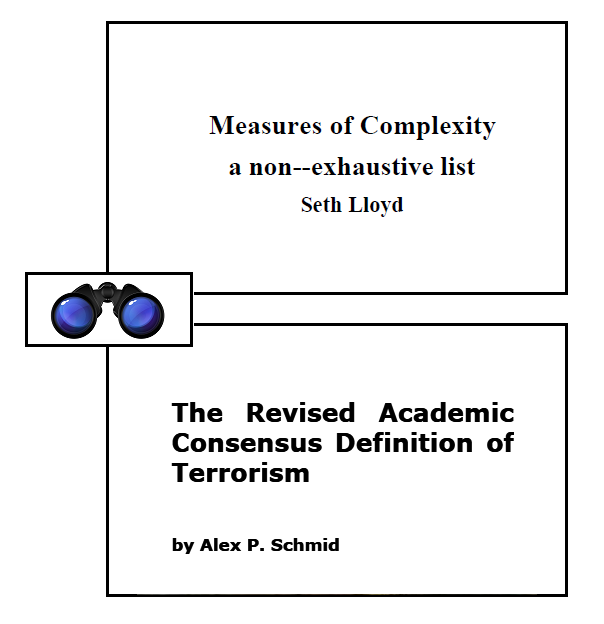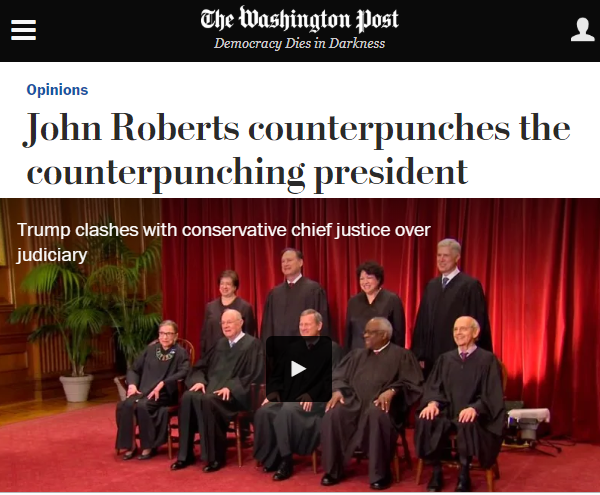A SITREP in four DoubleQuotes, holding the fifth for now
Sunday, October 13th, 2019[ by Charles Cameron — our substitute fifth today being a fine quote from a review of two books about analyzing humor, coming to us from down under ]
.
The purpose of this post it to present four facets of the present moment so as to leave a fifth perspective uncluttered for a later post..:
**
DQ #1: Complexity squared:
Presenting two papers which sum up the huge diversity of definitions which complexity and terrorism respectively are prone to:
It’s hard to say, exactly what terrorism is, but it’s no easier to define complexity- and when you think of the pair of them intersecting, the result is along the lines of complexity squared..
Sources:
:
Seth Lloyd, Measures of Complexity: a non–exhaustive list Alex Schmid, The Revised Academic Consensus Definition of Terrorism
Further, here’s a striking quote here from Alex Schmid:
A description how [the Academic Consensus Definition] was arrived at can be found on pp. 39 – 98 of Alex P. Schmid (Ed.). The Routledge Handbook of Terrorism Research. London and New York: Routledge, 2011. The same volume also contains 260 other definitions compiled by Joseph J. Easson and Alex P. Schmid on pp. 99 – 200.
and a complexity analogy with electromagnetism from Seth Lloyd:
An historical analog to the problem of measuring complexity is the problem of describing electromagnetism before Maxwell’s equations. In the case of electromagnetism, quantities such as electric and magnetic forces that arose in different experimental contexts were originally regarded as fundamentally different. Eventually it became clear that electricity and magnetism were in fact closely related aspects of the same fundamental quantity, the electromagnetic field. Similarly, contemporary researchers in architecture, biology, computer science, dynamical systems, engineering, finance, game theory, etc., have defined different measures of complexity for each field. Because these researchers were asking the same questions about the complexity of their different subjects of research, however, the answers that they came up with for how to measure complexity bear a considerable similarity to each other.
Complexity, illustrated:
Nothing in that image of waves lapping and overlapping on a shoreline could not in theory be explained in terms of von Kármán‘s equation for the “shedding” of vortices in a vortex street — but the breaking of waves across the coast of California –mathematicians can name the laws involved, but accurately describe the details over the last four decades from an Diego to Eureka? Waves bouncing off a fractal coastline?
Ahem, it’s complex. Though I suppose Ali Minai might inform me it’s not so much complex as complicated.
Consider, then, the complexity, complicated nature, or wickedness of the problem of definition in our two cases..
**
DQ #2: Yet another Uncertainty Principle:
I’d been thinking about the timeline of black swan takeoffs, thinking we might know roughly what the next five years could bring, but far out, farther out.. who knows? With this President, however, I’m forced to say Peter Baker is closer to the mark here than I’ve been thus far.
Time to adjust to the flappings of black wings…
Sources & quotes..
Both are quotes I overheard on MSNBC a couple of days ago, but didn’t have anything to hand with which to note program or time.
**
Dq #3: Cap’n’caps:
To cap it off, you have to admit the feeling is clear..
Here we see two kinds of explosive — the cap represents an explosive attitude, the caps the explosive power of 9mm rounds.
Let me put it this way: the sense of the two ads is twofold — security and threat, and the threat may make some of us insecure.
**
And to end on a lighter note, laughing at the way one bureaucracy can disagree with another..
DQ #4: Nature rejects, Nobel awards:
It is with intense satisfaction that observers note the Nobel Prize for Physiology and Medicine this year was awarded to Sir Peter Ratcliffe, for work that Nature, arguably the world’s top science journal, had earlier rejected.
Note also that HM the Queen was ahead of the Nobrl committee, having given Peter Ratcliffe a knighthood in the 2014 New Year’s Honours List.
But then Nobel Prizes are belated recognitions of what has long been obvious..
**
Okay, I’m holding the fifth DQ for its own post — but here to compensate is another entry in our budding encyclopedia of ouroboroi, this one from Ben Juers at the Sydney Review of Books, Stepping on Rakes:Terry Eagleton’s Humourand Peter Timms’ Silliness:
‘If you want to raise a laugh it is unwise to joke and dissect your joke at the same time’, Eagleton writes in the introduction, ‘but there are not many comedians who come up with a theoretical inquiry into their wisecracks at the very moment they are delivering them.’ No sooner had I scrawled ‘um, Stewart Lee?!’ unreadably in the margins than Eagleton butted in: ‘There are, to be sure, exceptions, such as the brilliantly original comedian Stewart Lee, who deconstructs his own comedy as he goes along and analyses the audience’s response to it.’
Talk about self-referential! Let me count the ways..
Clearly I need to watch me some Stewart Lee.










